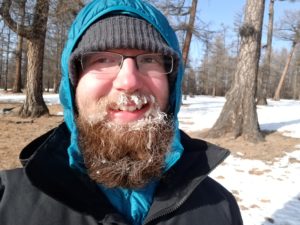Cameron Clark is a Linguistics Major graduating next Spring in the class of 2022.
Why did you choose to study Linguistics at Northeastern?
“When I was in middle school and high school, I took Latin classes and my teachers were amazing. My first Latin teacher was very fun and would come to class prepared to share facts and current events going on in the world of Latin; for example, tweets from the Pope written in Latin. Another teacher would do “Word of the Wednesday” where he would choose a word that he liked in Latin to share the etymology and where it came from. I always thought these exercises were fun and I continue to enjoy learning about etymology. After Latin, I began classes in Spanish and French while learning Italian and Russian in my free time. I like learning languages and about the many languages there are in the world. So, when I came to Northeastern and was unsure of what I wanted to study, I knew I had a passion for languages so I chose to pursue Linguistics without really understanding the program.”
What opportunities can you pursue as a Linguistics major?
“Northeastern has many combined programs with Linguistics. For example, you can pursue Computational Linguistics which is Linguistics and Computer Science. This is popular today because many companies look for people to work on Artificial Intelligence such as Amazon’s Alexa. What I am pursuing is Speech Pathology, so my minor is in Speech Pathology and Audiology in the hopes of attending graduate school to become a speech therapist. President Aoun is a Linguist; his PhD was on Arabic Syntax and now he is President of the university so there are many things you can do as a Linguistics major.”
Could you tell us about your co-op journey?
“My first co-op was an English teaching co-op in Mongolia. When I started looking for co-op, I  had very little idea of what I wanted to do but I knew I wanted to go abroad and travel. I looked at global co-ops and I wasn’t qualified for most of them but I saw a few English teaching positions in Vietnam, Costa Rica, Mongolia, and others. The people in Mongolia contacted me the next day for an interview and a week later they offered me a position. It was very impulsive, but I knew I wanted to travel and Mongolia interested me because I knew very little about the country. It was an incredible experience to live in a foreign country for the first-time teaching students English in a private school. I enjoyed the experience so much I decided to do my second co-op as an English teacher in Ecuador. Whereas before I worked in a private school and received a salary, this was a volunteer position in a public school working with a charity organization called the Tandana Foundation. The foundation placed me with a host family so my living expenses were taken care of and I was given a stipend for classroom materials, but I paid for my transportation to Ecuador and did not receive payment in the school. The community was very close so I was teaching students who were also my neighbors. As I begin to think about my next co-op, I have decided to take a different direction from teaching having done it twice before. There were parts I enjoyed, such as working with kids, but I don’t believe I would become a great teacher so I am looking forward to exploring something new.”
had very little idea of what I wanted to do but I knew I wanted to go abroad and travel. I looked at global co-ops and I wasn’t qualified for most of them but I saw a few English teaching positions in Vietnam, Costa Rica, Mongolia, and others. The people in Mongolia contacted me the next day for an interview and a week later they offered me a position. It was very impulsive, but I knew I wanted to travel and Mongolia interested me because I knew very little about the country. It was an incredible experience to live in a foreign country for the first-time teaching students English in a private school. I enjoyed the experience so much I decided to do my second co-op as an English teacher in Ecuador. Whereas before I worked in a private school and received a salary, this was a volunteer position in a public school working with a charity organization called the Tandana Foundation. The foundation placed me with a host family so my living expenses were taken care of and I was given a stipend for classroom materials, but I paid for my transportation to Ecuador and did not receive payment in the school. The community was very close so I was teaching students who were also my neighbors. As I begin to think about my next co-op, I have decided to take a different direction from teaching having done it twice before. There were parts I enjoyed, such as working with kids, but I don’t believe I would become a great teacher so I am looking forward to exploring something new.”
How was your second co-op effected by COVID-19?
“I arrived in Ecuador in January 2020 and I left the country March 14th. The school I was teaching at is in a remote part of the country and it was a small school, maybe fifty or less students in grades 2-7. COVID-19 wasn’t really an issue in the community until the day before I left. I remember teaching on a Friday and one of the native Ecuadorian teachers approached me saying the government ordered all schools in the country were to be shut down for the foreseeable future. Because the students don’t have many resources or technology so they would not be able to continue their education online, school was closed to them entirely. The next day Northeastern sent an email telling students doing global co-ops that they needed to come back immediately, so I was in the airport four hours later and two days later Ecuador closed their borders. I had a friend who also taught English in Ecuador at a private school so he was able to continue working when he returned to the states, but my co-op ended in March when the pandemic began.”
How did you approach your co-op search? Is there any advice you can offer for prospective and current students looking to complete a global co-op?
“With the first co-op, I was very open-minded in that I wanted a global co-op and I didn’t necessarily care what the position was. This made me unprepared for life in Mongolia before I accepted the job and it was challenging at times. For example, when I landed it was negative 36 degrees and I was unprepared for those weather conditions. With the second co-op, I did a lot more research about the position and country itself and the interviewing process was also longer. There were multiple interviews so I felt more prepared for accepting the position. I also knew more about the position because I had already taught English abroad the previous year and I knew more of the language in Ecuador so it was easier for me to assimilate into the culture. If you’re looking for your first or your first global co-op, I suggest doing research about where you would like to live without letting it consume your mind and take away from the process. Be open to accepting different global positions because you will learn a lot about yourself and your field.”
The Linguistics program offers five programs for study abroad. Why did you choose to study in Sydney, Australia?
“Honestly, I did not know there were so many programs for studying abroad in Linguistics, but I knew I wanted to go to Australia because I’ve been fascinated by the country since I was a little kid. I chose my study abroad based on my location of interest and I was very lucky that there was a Linguistics program at the University of Sydney. To those who may be on the fence about studying abroad or doing a global co-op because they are nervous or have never been abroad, they should take advantage of the resources at Northeastern because they will never regret the experience of being abroad. Our Global Experience Office also works with students to help them apply for scholarships so anybody and everybody has the opportunity to go abroad.”
While at Northeastern, you have completed two global co-ops and studied abroad in Australia. What did you take away from these global experiences?
“I was gone from Northeastern for almost two years. I did my fall semester in Boston in 2018, then I went to Mongolia the spring of 2019, went to Sydney for study abroad, and then went to Ecuador. So, I did not return to campus until the fall of 2020 and had a lot of time out in the world without knowing anybody. I had a lot of time separate from the world I knew to discover who I am and what I want to do in the future. That said, it was difficult at times being away from the people I know, but I met fascinating and interesting people from all over the world.”
What are your plans after degree completion?
“I am not entirely sure of my plans after graduation, but I intend to go to graduate school to study speech therapy so I can continue working with children and helping people. I want to go abroad again as well. I originally planned to take a year off from Northeastern and go to Australia last August for a work and holiday VISA where I work and live in the country. Unfortunately, COVID-19 changed these plans so I think I will do this for a year after I graduate from Northeastern instead.”

